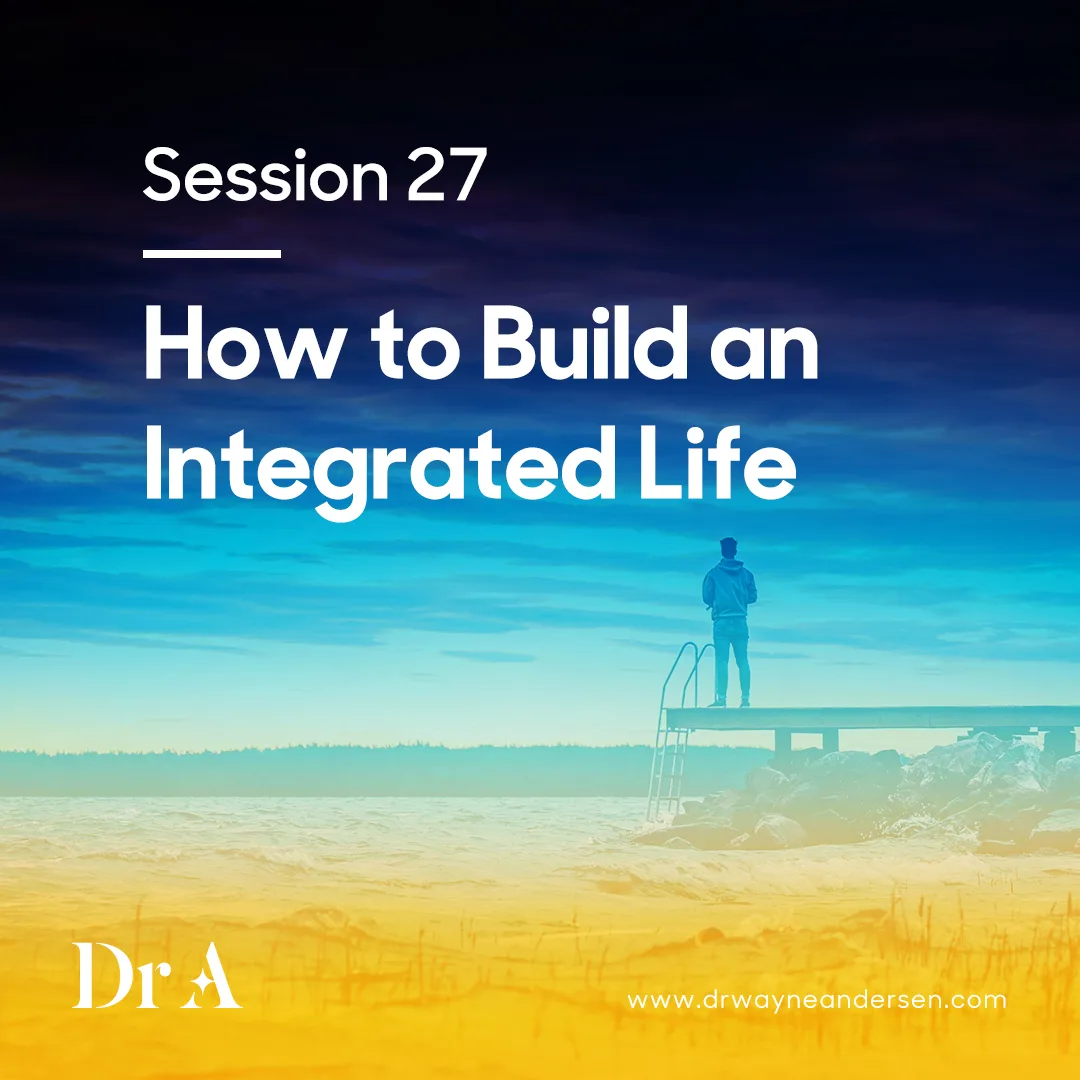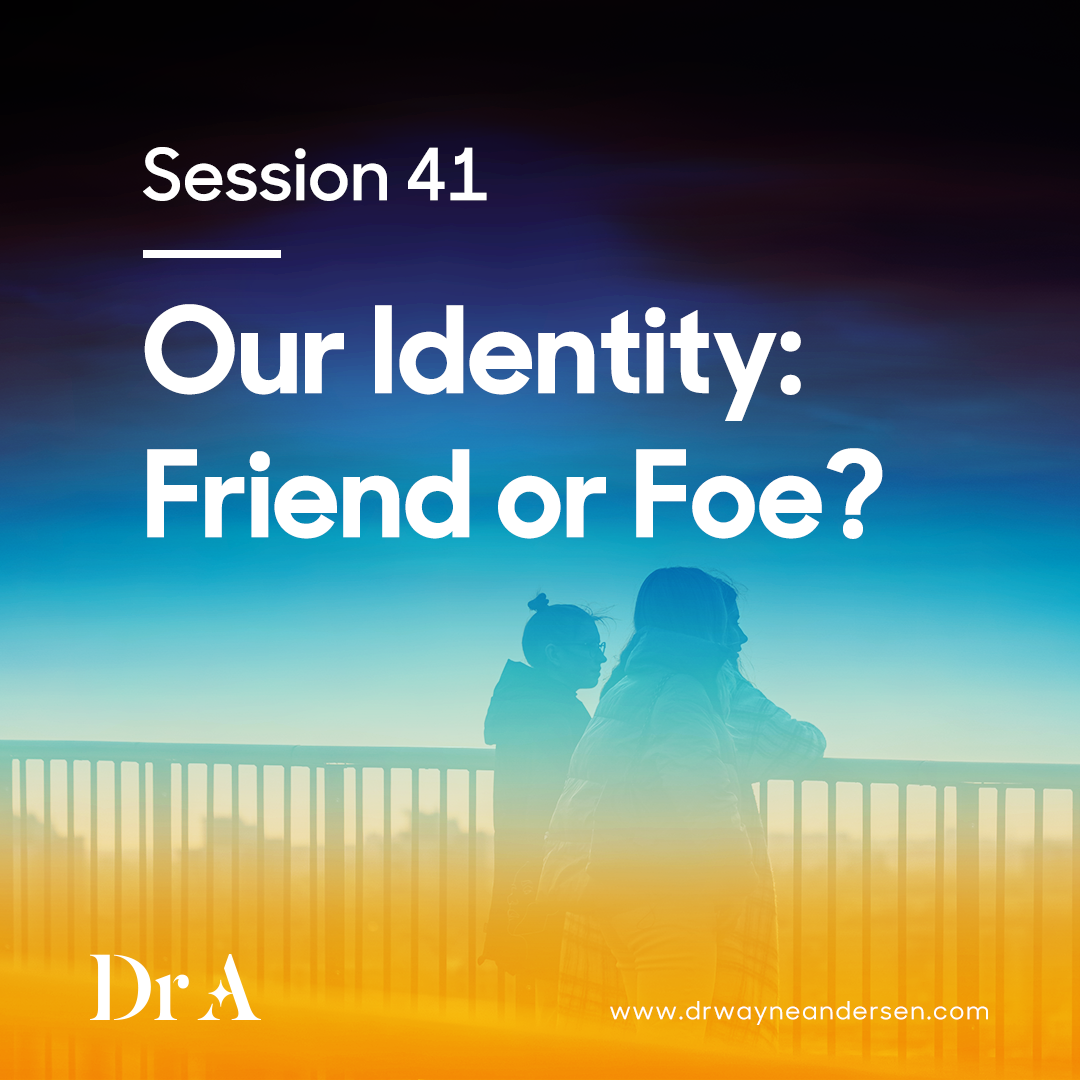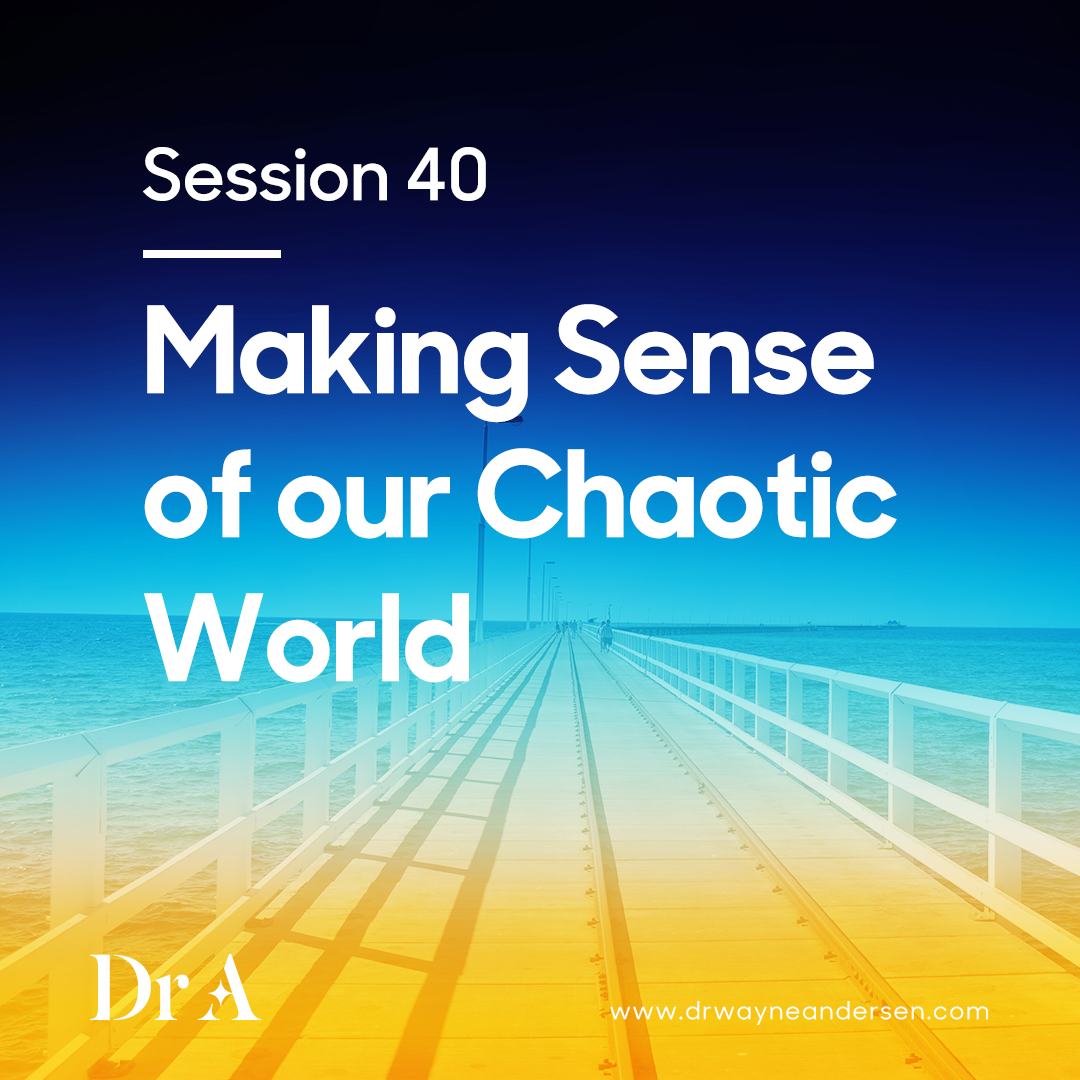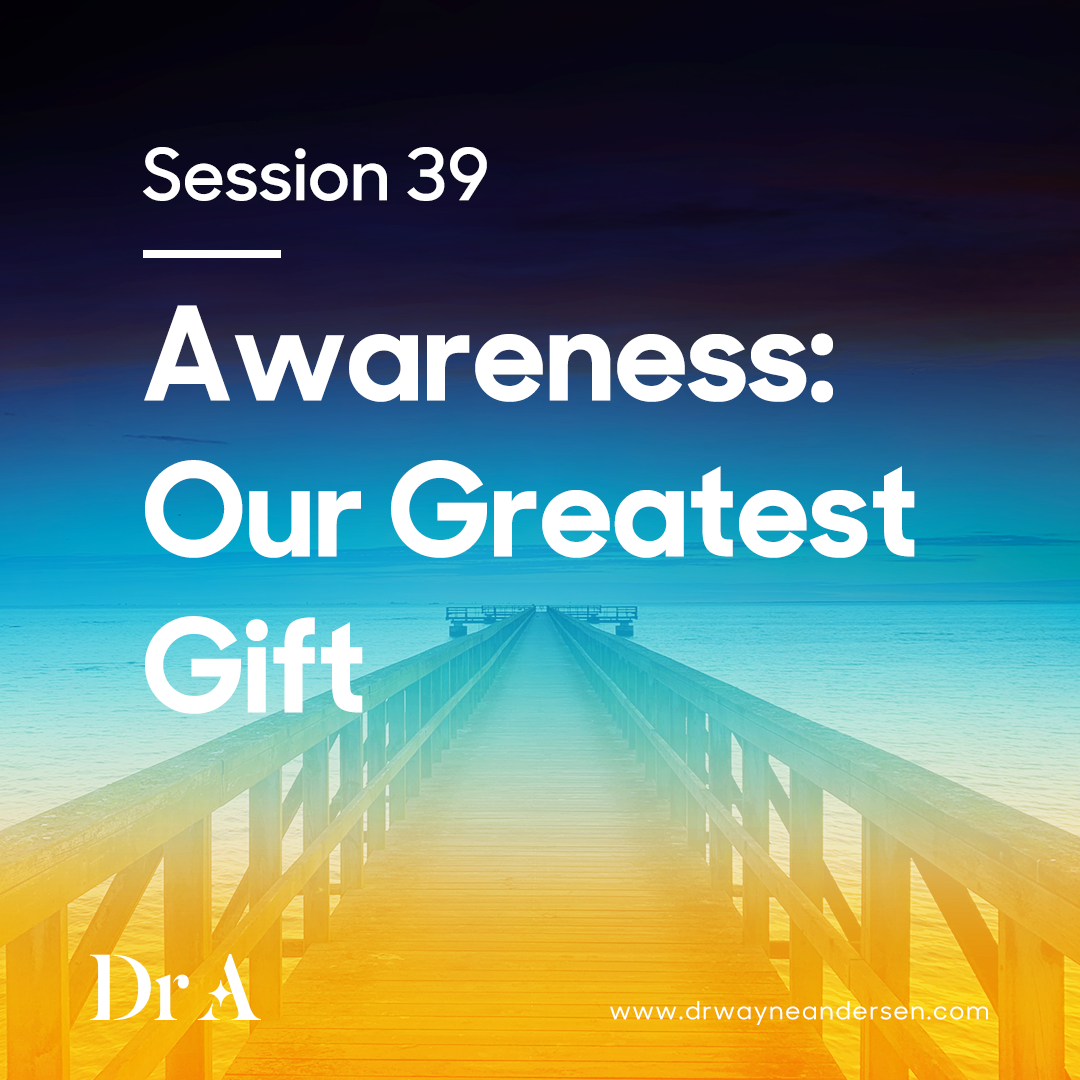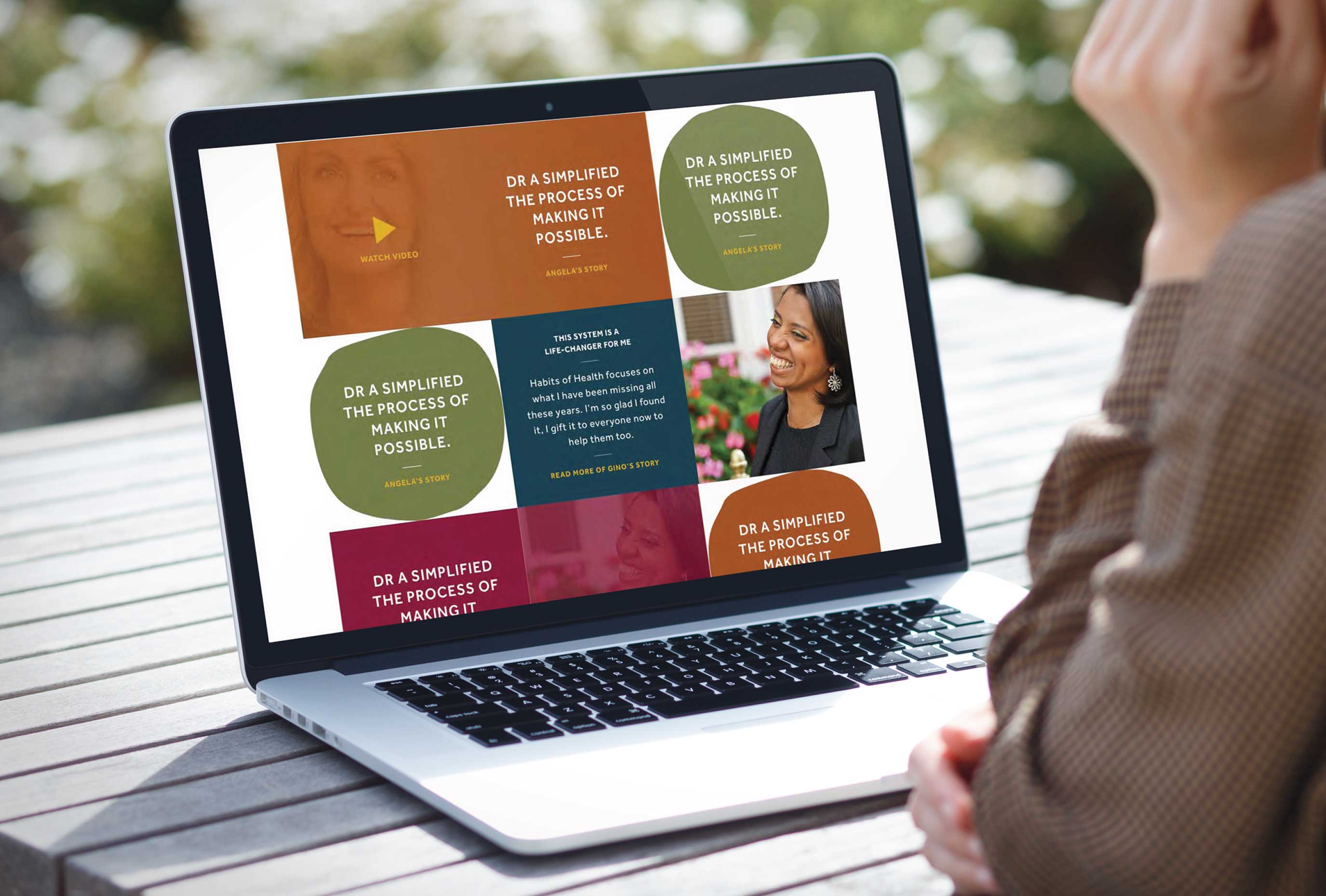There are seven key categories of wellbeing and life: physical wellbeing, vocational wellbeing, financial wellbeing, mental wellbeing, familial wellbeing, social wellbeing, and spiritual wellbeing. How are your seven key areas being valued and prioritized? Learn more with this month’s Conscious Forum: How to Build an Integrated Life.
Video Transcript:
Dr. A: Hello, everybody. This is Dr. A, and this is the Conscious Forum, and I apologize. I’m a few minutes late. I actually was in the back bowls of Vail, Colorado, and there was a potential avalanche danger so we had to go around and so it took me a little longer to get down here, but we’re together now, and I’m all jacked up. I’ve been thinking about it all morning, being with y’all, and we’re gonna have a great time today. So for anybody that this is your first time in the Conscious Forum, this is designed really, basically, for consciousness and you, and actually how you can now work on your vertical development.
One of the things I’m very clear of, especially with AI occurring, if we’re sleepwalking through life, we have absolutely no chance because AI is not only very intelligent but it’s being used by the largest corporations in the world to get you to do what they want you to do, not necessarily what you want to do. It’s really important to start first with self-awareness, and then self-regulation, and then advance beyond that. So that’s why I do this forum. We’re gaining audience. More and more people are dialing in. They really like it. They start to understand that starting things as simple as Stop. Challenge., and Choose., we have the opportunity to change the trajectory of our life.
So today we’re going to be talking about something that’s very important. Well, first of all, this is if you go to drwayneandersen.com all the sessions I’ve been doing over the last couple of years are there. They’re in video form. There’s content in there, everything is totally free and I’ve designed this to help us move to the next level of our health, and our lives. So I wanted to talk today about how to build an integrated life. You know, how to let go, how to understand that the world is happening.
We have very little control over the outside world but we have full control over how we respond to it, and we determine the outcome. So we’re going to talk today. We’re going to start off with a little review because last time, last month, I talked about the two main processes by which people live their lives and I think it’s really important to review this, and then we’re going to focus on you and building an integrated life. So breaking down the process of life, really, is two parts. There are two aspects that we are involved in what we do daily in our lives. Our lives are a continual set of days that turn into months, that turn into years, and you know, we’re now well into March. We’re into the third month now of our next rotation around the sun, and by now you probably settled into this year. You know, over Christmas, New Year’s, Hanukkah we kind of settle and kind of think, “Okay, what is next year going to be like?” “What am I going to do differently?” But unfortunately, if we’re basically using the first process, which we’re going to describe, probably not much has changed. What we want to do is focus, and if you haven’t engaged now in the second process we’re going to talk about that today and how to do that, and how to make that a reality.
So aspect one is an integrated life. An integrated life is what we’re going to focus on today. It’s basically an emergent processes, and what I mean by that is we basically know we have a future. It’s relational. We’re going to work on the dynamics. It’s warm, which means it feels good to us. It feels connected. We feel connected to other people. We don’t feel isolated — by the way, loneliness is one of the fastest growing attributes of people, not just in the United States, but in the world. Where people feel disconnected. They feel like they’re irrelevant. That they’re not part of what’s going on, and they’re isolated and it’s not a good feeling. It’s part of emotional mismanagement. It’s something that can lead to considerable dysfunction, and we feel connected. We’re connected together and that’s what this forum is about, connecting us, and I’m working with some of the top thought leaders in the world and we’re really working on: how do we provide an environment for people to change their trajectory? And it’s updatable. This is the most important part. You said around Christmas, New Year’s, Hanukkah, that you were going to do some things different. You had new resolutions. New resolutions mean you were going to add some things that add value to life. That’s updating.
That’s now changing. That’s not staying with the repetitive pattern. That’s actually updating where we are, where we’re going, and when we’re involved, when we’re now in the process of becoming more we are at our best as human beings, and that’s when we thrive, and that’s what we want to really focus on today, but first let’s just review what repetitive patterns mean. It’s a stagnant process. If you’re in repetitive patterns doing the same thing today that you were yesterday. Same thing you were last month, last year, basically, you are just getting more of the same. It’s the same. It’s the past. It’s not really growing. It’s not changing, and because the world is changing the dynamics— the cheese has been moved and it hasn’t just been moved to the next room, as they said in the old book, it’s been moved to a different planet.
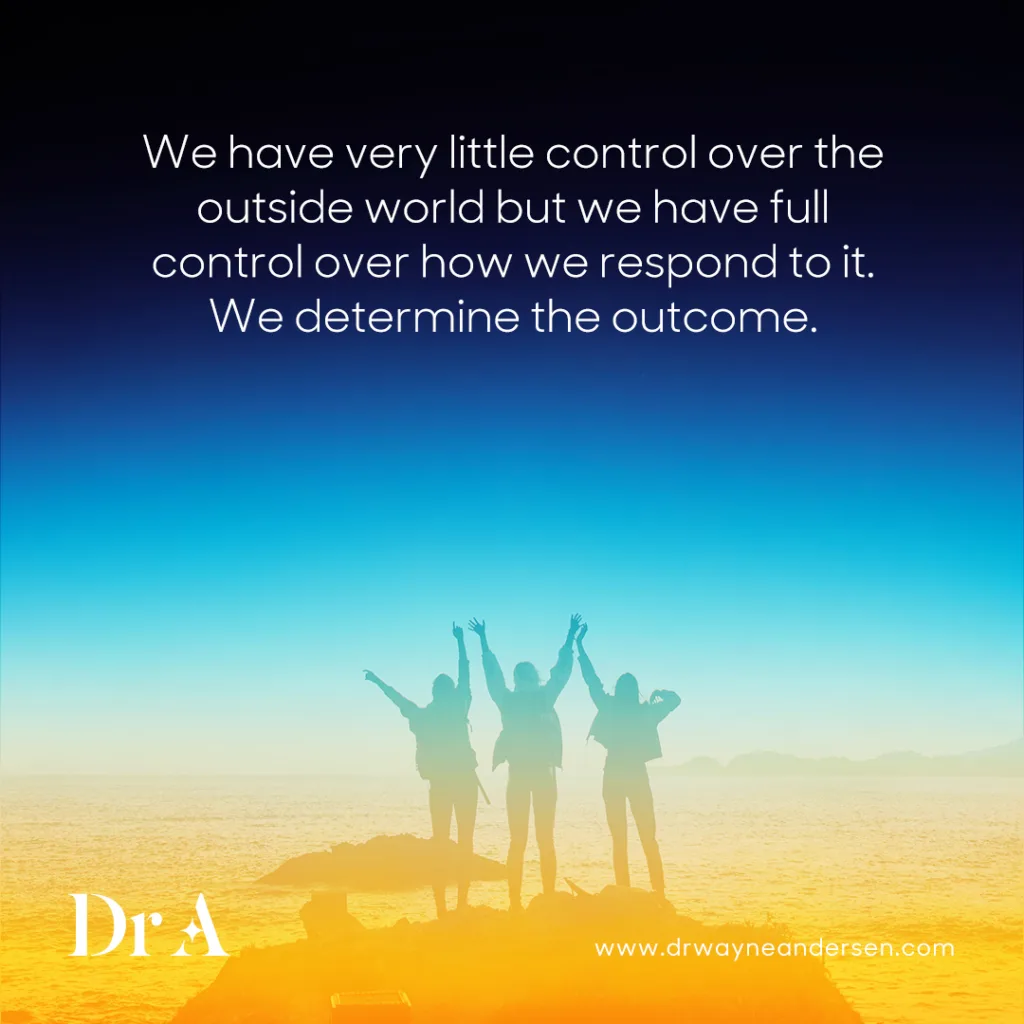
So with that, it’s really important to understand without updates, we have thought patterns. We have emotional patterns. We have behavioral patterns. We have relational patterns. We have family patterns. We have work patterns, and we have generational, which actually go from one generation to the other. So if you were more likely to be overweight, your parents are more likely to be overweight, then you’re more likely to be overweight, and these are patterns that unless we update and we change the data that’s inside, then we don’t change. So we get repetitive patterns that don’t allow us to emerge and evolve. So what’s happening? Basically, it’s important to be non-judgmental as best you can. I mean sometimes you’ll beat yourself up. You’ll sabotage yourself, but if things are cyclical in their life, the same things keep happening. We need to create more space around those things, more awareness, and that can bring change through the awareness.
Without awareness, unless we understand that these things are going on, these patterns are happening over, and over, and over, again and if we’re not aware of them— that’s why journaling is so important, right? It’s so important for us to write down your repetitive patterns. What you’re feeling. How your body feels to those. What our behavior is in certain situations, and then we can address them. So then we can look through a new lens. We can now be open, curious, and how do I create this space around it? Not trying to change it immediately, but just understand, why am I sensing this? How am I feeling this? How am I in my relationship? If I have a relationship that every time I’m with this person it seems to go south, and I leave shaking my head. Then I need to understand that, and you know, is it because of our culture? And also, what is missing? What is not allowing us to update, and now grow, and become more, and move beyond that?
So all these things are really important. So in essence we have two processes, the repetitive patterns of the past, which we continue, or emergent patterns. These are the new things. These are the things where you know 80% of what we have inside of us literally isn’t serving to take us to where we really want to go. So if we sit down and ask ourself, what do we— if you don’t want to change, if you want to remain the same, then this stuff doesn’t matter, but if you want to grow, if you want to learn, if you want to be able to keep pace with the speed of the world, and be able to cope with it, not just cope with it, but actually thrive in it, then it’s important to develop emergent patterns.
So let’s talk about an integrated life. This is kind of what I want to really focus on, and let’s start by looking at the key areas of wellbeing in our life. You know, there’s seven key categories: physical, our physical health. You know, how we move, how we feel, how are we within that on a scale of 1 to 10, and we’ll talk about this in a minute, but where is our health on a scale of 1 to 10? Vocational, what we do for a living. It’s interesting, but they did some studies and looked at vocation, and what we do for a living is twice as important as anything else in terms of how we have a sense of wellbeing. That we’re connected. That we’re doing something that’s important. That’s why updatable to emerge is so important. Financial, how are our finances? How do we manage money? Is money a foreign thing to us? Is something we think is bad or evil? Mental, obviously this is a big one and one I work on all the time with people, and with myself. I’m looking on growing to build my emotional management so I’m more emotionally agile, and whatever’s thrown at me I can handle it. Familial, I mean obviously our family is important, and how do I deal with my family relationships? Social, our social interaction with others, and of course our spirituality for each and everyone, but these are the seven key areas, and it’s really important to look at those and you should write that down: what we value most determines our purpose.
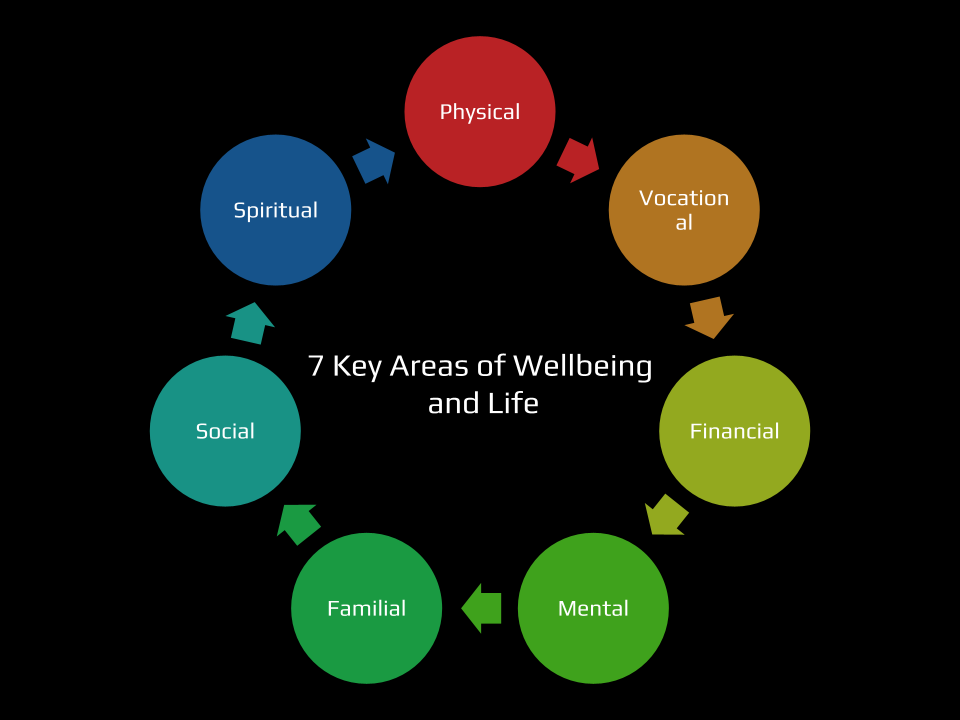
So our highest valued areas need little motivation, and I always talk about if you were mom and you were on the 50th story of a building, and your kids were in the room across the way, and there was a fire broke at in the middle and you couldn’t get to them through the traditional inside, but there was a ledge off of your balcony. They could get to their balcony, and it’s 50 stories high, and it’s a small ledge like this, would you think twice before getting on that ledge and going over and getting them? And the answer is of course: no. Because you value very much— the highest value, obviously, are your children, especially, you know, a mom. That’s innate, and so you would think just a second and then you’d be on your way to go save them. So the things we value most, basically don’t require as much motivation.
So taking charge of these seven key areas leads to optimal wellbeing. If you don’t value a key area someone else is going to take charge of it. So we very much know if you don’t value your health. The food industry and all the nasty foods, and potato chips, and stuff, you’ll be buying those things, and you’ll be helping them make more money, and be more successful. Become clear on what you value most. This sets the stage for everything as we integrate because the things that are most important to us of those seven key areas will determine whether you’re making progress or not, and I love this slide, I’m actually up here in the mountains and I went out to dinner last week, and we went to a remote place up in the woods, on the side of the mountain, and it kind of looked like this [Dr. A refers to a slide on screen]. I mean, obviously, it was bigger than that, but you know, I can tell you a hundred years ago, before there was electricity, before there was civilization, before there’s anything there, living in a little place up in the woods would be really tough. I mean now it’s fun. You got to eat, and you have meals, and I had fish, halibut that was from Alaska, that was flown in, I mean, we live in a very different world and our technology has certainly done many things to make life more comfortable, but bottom line is, if you were out a hundred years ago, and you were out in the middle of the snow, in the middle of the mountains like that and you saw a warm cabin like that, you notice there’s a straight line right to the cabin, you’re not a dilly dally. You’re not going to go left and think, “Well, I think I’ll work on this one for a while,” or, “I think I’ll sit out and look at the stars.” No. You were going right there. That’s what your highest valued areas.
[00:10:39] So it’s so important for us to find what we value most and that will propel you. you know, basically our current life— we’re in a fishbowl and depending on what your life’s like, I mean people rate their life and certainly you want to rate your life in those seven areas, and most of us, what we think we can do, but what we really want is more, and once you figure out what the things you value most, what your purpose is, what you value most, it can propel you all the way to the the the big fishbowl. The one you really want that has the nice grass in it, and the nice view, and everything. So it’s important to kind of put that in what you value, what you prioritize.
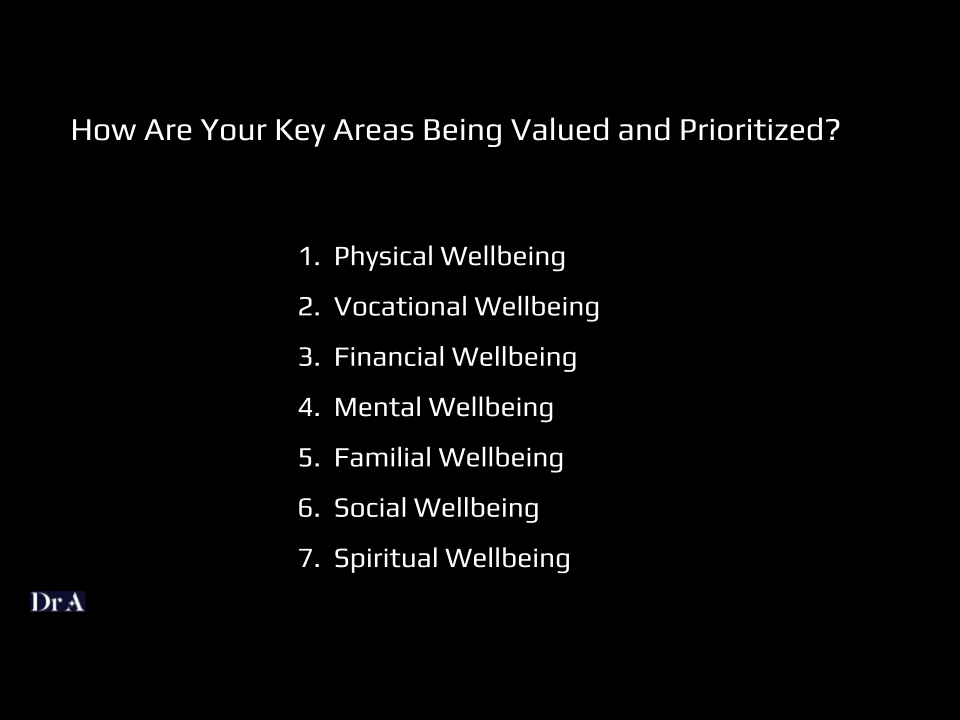
So if you look at the seven key areas, and you should take a screenshot of this. I think it’s important because you’re going to want to do this work on your own. We’re not going to have time to do the work. We’ll talk about it today, but you’ll have to do the work on your own, but take those seven key areas that are important, and then figure— you’re going to figure out what you value most. Language helps us know the truth. Our Olympic area, our emotional area in our brain doesn’t have language, but our prefrontal cortex, our human brain, the upper brain, if you happen to have the Habits of Health you can go into to Element Four in the LifeBook and you can look and see how the brain develops, but the highest part of the brain, basically, is linguistics, and if we look and we ask ourself, right? Because truth is the great liberator, of those seven key areas, if we categorize using the language — and you should take a snapshot of this one too — of those seven key — and I’ll put this, this will be on the website — but if you look at those seven key areas, ask yourself in each of those seven key areas what language you use to describe your relationship with that area.
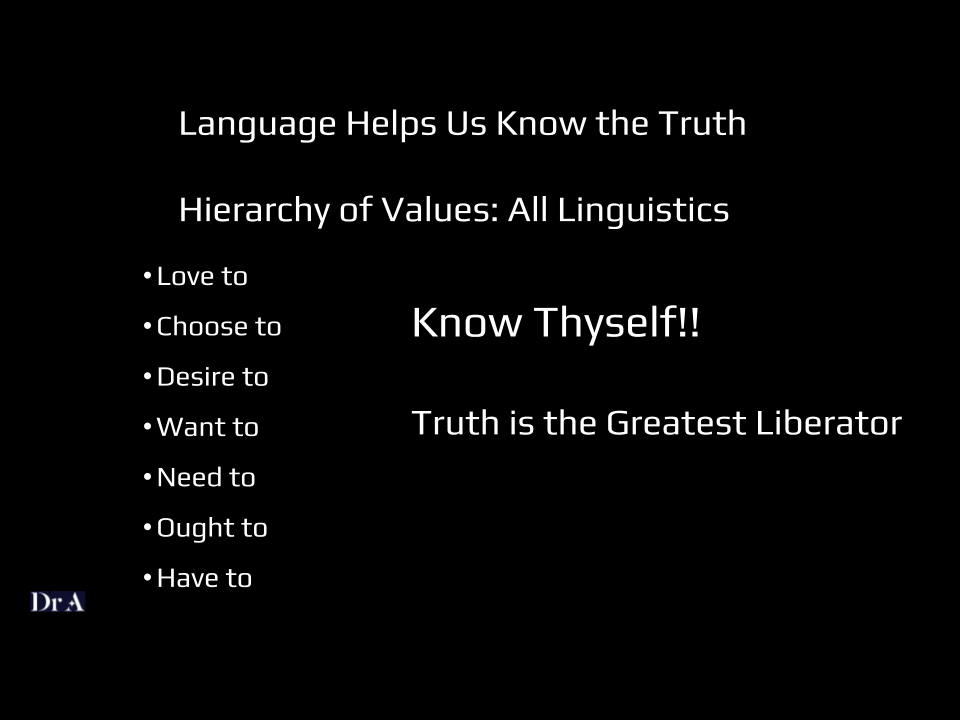
So let’s take your physical health. You know, if you’re saying, I have to, or I ought to, or I need to, in terms of your physical health, you’re not going to do anything. But if you desire to, you choose to, and you love to. You know, some people, basically, over time learn to love going to the gym, or they love going for runs, or for walks, and over time it becomes important to them and that’s what you want to look at — the key areas — because what you want to do is start with the ones that you love to do. So take all seven key areas and then take the language from here, and ask yourself in these seven key areas, where’s my Northstar? What are the ones — if they’re: have to, ought to, or need to, as you can see they’re smaller. Those aren’t things you’re going to want to focus on in the beginning. You’re going to want to focus on the ones that actually are important to you, that you love to do, or choose, or desire to, because what that will do, that’ll start you on a path, and then you can organize your life around it.
So these are my hierarchies. I put them down, mine is, as far as vocational is to become a world leader in health and wellbeing. To actually help pioneer vertical development or consciousness for anyone that raises their hand, that wants that, and in support of that, just like today. I got up early this morning. Normally I don’t like to get up at the crack of dawn, but I did because I wanted to get in some skiing in because it was a— it’s a powder day, and I went up with a good friend of mine and we went up to the deep powder and got in two hours of really intense skiing. So that supports my physical. Clears my mind. The spirituality of being in nature was amazing. Financially, obviously, we do this, we bring value to the marketplace. So that’s important, and my family is ultimate. Last weekend I went to Phoenix to be with my daughter who just got accepted at vet school and we were there for our open house, and to find her a place to live, and I wouldn’t have missed it for the world. Those three days together, and now we were even kidding around as she’s going to be the young, new Dr. A. So it continues on, and so these things are really important.
The social are supported by spiritual because I love helping people, and the metal part is at the base, you can see, of all of it, but they all work together, and so it’s important to kind of find out, what are the things that are most important? It might be family. It might be being a mom. It doesn’t matter what they are, but then you can organize them in a way where you see they support each other because if I’m physically, spiritually, financially, and healthy in my family then I’m able to spend more time helping others and I’m also then, because of that spirituality I have, a good social interaction, and I’m mentally in a sound place. So hopefully that’s important.
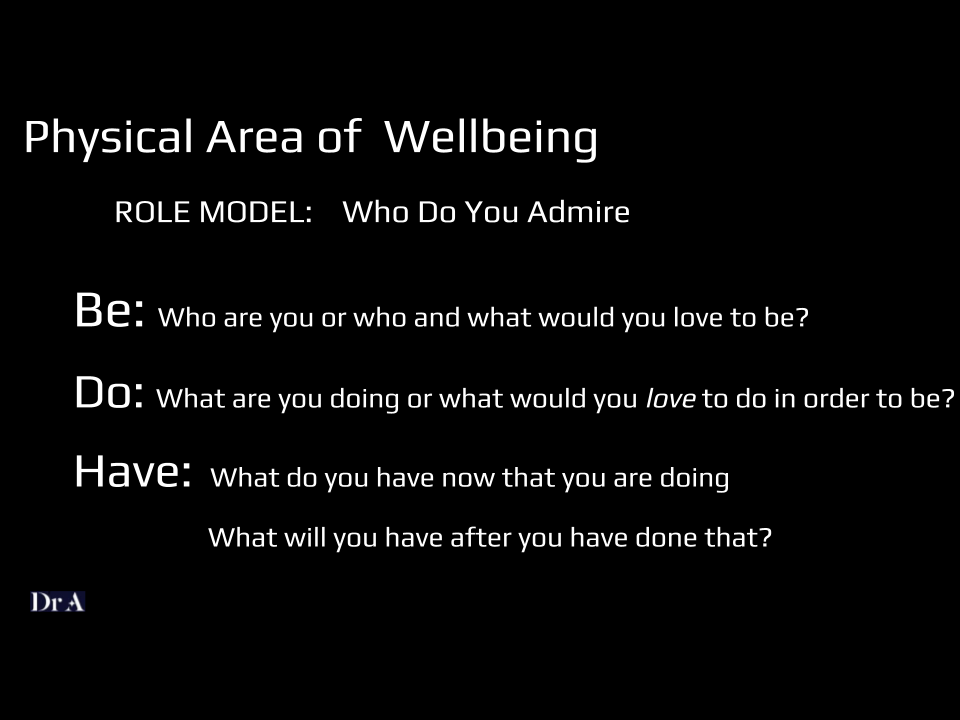
So just taking— once you’ve got all of them you want to basically take each area, and you start with the ones, as I mentioned, that you value the highest, and a good way to kind of categorize this — you should snapshot this too — this happens to be an example of physical area of wellbeing [Dr. A is referring to a slide on screen. The slide is featured above]. So role model, who do you admire? Who’s someone that you look up to? That is a great physical specimen and then: Be. Who are you and what would you love to be? So in terms of I’m focusing on physical, but you use this for all seven. You know, what would I love to be? What would I like to look like? What would I like to feel like? What kind of energy level? Then: Do. What are you doing? What am I doing? And one of the things I’m doing is, I love to do, is I went up and skied. I skied this morning. So, have. What do you have now because of what you’re doing, and what will you have after you’ve done that? So, in other words, the more you work on it, you start updating that process, the more successful you’ll be. I’d like to now is just kind of open this up for questions. Let me take this off the screen share, and we will open it up for questions. So, Rachel, who we got?
Rachel: We actually haven’t gotten any questions yet.
Dr. A: No questions.
Rachel: No, not yet.
Dr. A: Okay. Let’s talk about— let’s take somebody that wants to— oh, Chris. Go ahead, Chris.
Chris: I got a question for you. This is applicable right now. Dr. A was on the mountain, doesn’t know this, but Facebook, WhatsApp, Messenger, Facebook and Instagram were all down for an hour this morning. One hour. Now that may not seem like a big deal, but to people that live in social media, it can be a little cumbersome, a little crazy. I don’t know if anyone else in chat was dying. Yeah. People are mentioning they were dying in there, mentally. What do we do in those situations if you find yourself in a situation like that? Where something that you rely upon for probably 50% of your daily duties, your daily activities, what do you do when it’s just suddenly shut off?
Dr. A: Well, I didn’t even know it happened because I was up on the mountain, so that’s, I’ll start there. Plus the other thing about social media, it’s nice to feel connected, but having a hiatus like that, I would say that’s a great time to journal. You know and I think Chris, you asked a great question. So you know, what did you feel like? Were you stressed? Were you anxious? Did you really miss that time? Because you know, one of the things, and I’m getting ready to go to a retreat with 20 top conscious leaders for four days, and we’re not allowed to have our phones there. It’s totally silent. So you take care of, obviously the things, and families know where there’s alternative things they can go if there’s an emergency, but beyond that, that period is— we are on this electronic leash, and the leash is become so dependent on it, and we’ve used it as a coping mechanism that it basically is, I think it’s an awesome thing to have happened and you know, obviously if it’s something about health or something where someone needed to communicate, but we still— the phone still works, right? The phones worked. So you can still go the old-fashioned way and call. I would actually say it’s— maybe that hiatus, those three hours were a time for people to reflect that, do you want to be tied to the electronic leash all the time or do you want to become aware and put yourself in position?
So I think it’s really, really, really important for us to realize that dependency on electronics is not necessarily in our best interest. In fact, I would say, well, all you have know is that when you go on the internet or go to social media, I mean you’re flooded now with AI, right? Everything you’ve ever bought, or thought about buying, or said you like, now you’re bathed in a circle of it, and it’s actually not allowing your human mind to think for itself. It’s actually getting you to basically, almost like a spinal animal, “Oh, I like that,” and then you’re spending 20 minutes buying something you neither need or really want, but it looks cool so you buy it. You just put yourself more in debt, and you got yourself something else. Some junk that over a month or so you’re not going to use anymore. So I think for me, I would say actually that was probably a good thing for most people, but most people I bet actually were stressed about it. They’re upset about it. That’s a good calling out for you to say that maybe you need to do some of this work.
Chris: I love that. Thank you, Dr. A.
Dr. A: Yep. Thank you for intervening while Wanda came on.
Rachel: Yeah, Wanda. Can you come off mute?
Dr. A: Hi, Wanda!
Wanda: Hey. So I had a question right off the bat, and I hesitated because I asked a question in November and then followed up with you last month. So I wanted to kind of give space for other people, but I thought, hey, if no one else has a question, I’m coming on! So, I have been on a health journey for two years, utilizing our program, and the Habits of Health and all those, and I still feel I’m very new at actually applying it all now that I’m almost to Optimal Health. I’m trying to apply it to finances, relationships, and sometimes I get really overwhelmed by trying to apply all of these principles to every area, and then I’m getting in a repetitive habit, I’m noticing, and I am working with my health coach and a therapist, but I just wanted to see if you’d speak to this because I can’t be the only one. Like sometimes to try to apply all of these things that make sense, but because I lived 50-plus years in a whole different mindset, that created the unhealthy version of myself that I began working on two years ago. When I start transferring these to every area it almost feels unbearable and I’ll just collapse. Like, just not be able to do it. Does that make sense? And I’m trying to take it slow, and I’m trying to apply all of this to every area, but it can get a little bit overwhelming to try to address every area of life. Does that make sense?
Dr. A: Yeah, sure, and the first thing I’d love you to do is get rid of the word, “try.” Try is the most demoralizing word in the English language. It means, oh, I’m gonna try. I’m gonna give it the old try, but I now have said well, I tried, and I couldn’t do it. So you either do or you know, Yoda, that sat there in the swamp with his fighter jet, with Luke’s fighter jet, and Luke tried and he couldn’t lift it. He moved it a little bit and then Luke, Yoda, brought it right up. He said you either do or don’t do, right? So that’s the first thing. The second thing is there are seven key areas to focus on, but you got to find the ones that are the most important and start there, and what you’re really looking to do, it’s not like you’re going to go do like 70 things in each key area. You find the area like that’s why I picked physical health, just as an example, but you find the one that is really important to you. One that kind of sets the keystone, right? It’s the one that— it’s the key, like an archway, right? That sets the arch and allows it to stand. It’s the one that supports everything else, and you find that one, and you work on that one first, and what happens is through the halo effect, it starts affecting your other behaviors. You’re not looking to work on seven areas simultaneously, in every area of it. You may pick one little thing.
[00:22:35] So for instance, just around, and congratulations on almost being at optimal health, because that’s a good thing, and that’s a great thing. So you’ve actually made dramatic improvement. The other thing we do is we beat ourselves up. Like, oh, I’ve got this one thing going but I’m not so good in these areas. No one’s good in every— no one does everything great, right? In fact, that’s why specialties occur, but the bottom line is, if you think of fundamental ones and one of them to me always is physical health, the other one is always emotional health because both those areas are key for long-term health and wellbeing. To be able to not just survive but to thrive, so when you start in those areas, whatever areas you want, it could be your family, but when you start working in one area and you start saying no, and using a full body yes, and you only say, yes, to when you feel it here, in your mind, in your heart, and in your gut, then what happens is you’re starting to clear the funnel. Right now you have so much stuff in there. Most of the stuff you have in there isn’t really serving you, right? About 80% of what you have in your thoughts and in your feelings aren’t really serving you. Only about 20%.
So you want to start emptying those things, and emptying those things includes everything from people to things, to places, to underline structure of what you do, and you start looking at, is this serving me? That’s why journaling is so important because you can look and say, okay, in the next five years I want these things that happen in my life, these are my kind of my future goals. I’m leading and I’m going to lead from that future. In the present you write down every day, what are the seven or eight key things you did during the day? And then you can get a green, an orange, and a red magic marker or a pencil, and you basically, next to those things at the end of the evening, before you go to bed when you have time for you. Your time, Wanda. Your personal time. You can write down next to them and put a red, a green, or an orange. Whether green is if this helped move you towards what your goals are, orange if it didn’t really have effect one way or the other, and red if it’s actually taking you away from those goals, and so when you look at that, you’ll find out that in the beginning you’ll probably have more red than you would like.
So your first goal is to simply start eliminating those things that are in red. Then basically, eliminating the things that are in orange, and then focus on only bringing in things that are in green, right? That are moving toward— and that is intentional. You do that a little bit. We’re talking about in baby steps. Little baby steps each day, changing, and what you’re doing is you’re now updating yourself, and your identity, how you think about yourself, like because you’re saying how you get overwhelmed and sometimes you self-sabotage yourself, and you do that because basically, you’re overwhelmed and you don’t want to be overwhelmed, so you— it’s not that you’re trying to change this overnight. It’s going to take time. I’ll give you an example, it snowed a lot last night and skiing in resort skiing, where the snow is either groomed, or it’s hard packed, or you can feel the bottom is different than in powder. In powder, you can’t turn quickly because there’s nothing down there to turn to so you have to be patient, and the same thing with this. You said for 50 years you’ve been a certain way. It ain’t going to change overnight, and so you’re not expecting it to change overnight.
You just want small, little changes that occur over time, and as those occur, you know, there’s a book by Dan Sullivan and Benjamin Hardy called The Gain in the Gap, and so what the ideals of what you want, there’s a gap between where you are now, your current reality and your desired outcome, and so what you want to do is basically figure out, okay, my desired outcome are these things, what are the secondary choices I have to start making to be able to move to that desired outcome? And so what you want to do is start eliminating the things that don’t take you there, and focusing on the things that do, and it’s as simple as that, and if you add one thing, you’re basically starting to move and structural tension allows to pull you towards what you want because you care about it. That’s why I showed the slide of the little hut up in the middle of the cold mountains because if you know what you want, and in that case, you want– if you’re out in the cold, and it’s at night, and you’re about ready to freeze to death, you see a little cabin, you’re not doubting you’re going right towards the cabin. Well, you know the fundamental things now that are going to take you where you want. Those are the things you want to focus on and then start— you know, every time you eliminate one of those, on your journal, you eliminate one of those red, and you add one of the green, you’re now creating a double duplication.
It’s like in football when there’s someone on— the team’s on the one-yard line and they throw an interception, and the other team runs it back for a touchdown. That’s a 14-point change in the game. That’s a huge change. Many times insurmountable. If you basically remove one thing that’s not helping you, and actually is hurting you, and you add one thing that is, that’s a 14-point change, basically. Does that make sense? So focus on those little wins and over time what you’ll find out is over a period of weeks and months the new behaviors will take you so you’ll start changing your identity. Your identity are the standards you set for yourself. One of the standards I said a long time ago for myself is I make my bed every morning. Even when I’m in a rush, I make my bed every morning because I know that that starts off the day in a constructive way, and there was a famous admiral that did a graduation speech and talked about that, you know, and little things like that they actually start changing the way you think, and now you get in the creative process, and you’re focusing on what you want, not spending time in the past or what was wrong in the past. Does that make sense?
Wanda: Yes, and the— you said this before to someone else, and I just, it kind of went kind of went “bloop,” and now you’re specifically saying it to me, but it’s the journaling. Like I’m sitting here taking notes while you’re talking so I am one to write it down, but I don’t journal. It’s all in my head.
Dr. A: You can’t keep it all in your head.
Wanda: That’s probably where I need to start, is the journaling. So.
Dr. A: That would be a great place to start and let me tell you why. Let me tell you why, because you have a conscious and a subconscious mind, right? Your conscious mind is what you’re bringing and becoming aware of. Your unconscious mind, or subconscious mind, is below the surface, below the water line, and there’s things that have happened all the way since you were a little kid that are in there and you don’t really, you’re not aware of a lot of them, and a lot of them are actually, they’re basically part of your personal mind. You’re the chief architect of your personal mind which is your ego and basically, that’s designed to try to keep you safe and it’s actually something that keeps you from fully being aware of what’s going on. It makes up stories. It doesn’t want you to feel uncomfortable and that’s one of the things, as a human, we want to be comfortable. We’re designed to be comfortable. That’s why we have habits and our bad habits served us at one time, they may not serve us now, but all the subconscious stuff, you aren’t even aware of. The only thing you’re really aware of is the conscious stuff, so bottom line is everything you have in your head dissipates and so you may remember one thing I said, but not something else, and so what you want to do— and the thing that I do when I’m working on a concept or something that I want to learn, a new behavior an updating, whether it’s a ski move, or it’s a mental health issue, or it’s a physical activity, or it’s relational health of how to talk to someone, when I’m working on something like that, that I have not mastered, I basically go, if I’m reading a book about it, I underline it. I go back to it. I go back to it.
The way you learn is through three parts, elaborative encoding, which means you find something that’s similar to it. So the one I always used, because it’s about memory is, there’s a guy named Ebbinghaus, right? His first name was umm, yeah, I’m forgetting it right now! The guy who was the goofy guy, PeeWee Herman. Hermann. His name was— see that’s how I recalled it. I recalled it because I thought about something else that I knew which was PeeWee Herman. So now I remember his first name was Hermann. Do you see that? So I’m able to recall that because I’m associating with something else that I remember, right? And I actually remember Herman’s Hermits, PeeWee Herman, so that’s how I recalled it. So elaborate encoding means that you’re actually finding something you already know and you’re pairing it so you can remember it. So, you know Hermann Ebbinghaus. I remember Ebbinghaus because you think of ebb and tide of a— flow of the ocean, and basically a house floating back and forth in the ocean, right? So that’s how I remember the name. So that’s elaborative encoding.
[00:31:27] Second thing you do is space repetition. You go back to it multiple times and basically, so you actually learn it, memorize it, and the third is a recollection. It’s basically being recalled. It’s being able to remember. So that’s what I just did there. I recalled it, basically by thinking about the name of elaborative encoding and I brought it back. So that’s how you learn new things and you’re actually changing your neural pathways through neuroplasticity, and that’s how you can learn. Old dogs can learn new tricks, and basically, there are 80, 90-year-olds they’ve studied at Stanford that had serious issues of things like insecure attachment. So when they were babies they never really got cuddled or cared for and so they’re kind of cold people. You know, there was a lawyer that was 90 years old that went into Stanford and they did the work with him and he came home to his wife who he’d been ignoring and started loving on her again because they work with that. So all the stuff is doable, but it’s done in small little space repetition. Yeah, journaling is something, because you have to write it down, but when you write it down you now have it.
I have a journal that I have right now and basically, I keep it in my knapsack, and basically, I can go through that and something I’m thinking about a couple of weeks ago, that I’d heard or thought about, I can go back to it. I’ll take notes later today. I’m going to go back skiing when we get done here, but at the end of the day I’ll take notes on some of the things we talked about and then keep those to learn from them, does that make sense? [Wanda shakes her head, yes]. Cool. All right. Well, good luck on that. You’re doing great. You’re— remember, forget looking at the gap where you want to go and how far you have to go, look at the gain and how much you’ve changed since you started working on yourself. It’s dramatic.
Wanda: It’s incredible. Right, and I don’t want to go back, and so when I start trying to move forward in another area, I can fall back, so I just.
Dr. A: There’s no going back. It’s always going forward. So when you start to think about something from the past, basically say, oh, I’m thinking about that. Discard it and remember, your past isn’t the same as it was when it was happening. Your evolution of where you are now is different than there. If you have something from the past that was important for, you can reconstruct it in the present to serve your future.
Wanda: That’s great. Thank you so much.
Dr. A: You’re welcome. You’re so welcome. Okay, who else we got?
Rachel: All right, next up we have Shelley. Shelley, can you come on camera and unmute yourself? There you are.
Dr. A: Hi, Shelley, you’re still muted. There you go.
Shelley: First time. I’m just kidding.
Dr. A: There’s always the first time.
Shelley: So my question is, and thank you for taking time out of your skiing day to do this with us. Appreciate it.
Dr. A: I would never, I wouldn’t miss it for the world and I apologize I was late. I was ambitious thinking I could get down here in time.
Shelley: I like it. Fun and work all the same time in life [crosstalk 00:34:28].
Dr. A: I can’t tell you, it’s funny, Michener, that wrote Hawaii and the Caribbean, and stuff he had, I love a famous quote. I should find it, but he said, you know what? I’ll let someone else figure out whether I’m working or playing. To me, it’s both. Right?
Shelley: Exactly.
Dr. A: That’s how you want to live life. you want to continue to grow, and learn, and be a service of others, but you want to grow yourself too.
Shelley: Exactly. I love it. So my question is, just a pattern that I have seen emerge is that when people start making changes, and shifts, and they start growing and doing some of this consciousness work, and changing their health, I’ve noticed that it’s a disruptor to a lot of relationships and people feel threatened, you know, by your changes or especially in a marriage relationship, and if the other person isn’t wanting to grow and evolve with you. Sometimes it can seem like that’s really where people hit a bumpy path, right? And then they either— seems like they make a decision either to just abort all of their changes and go back to the comfort zone to keep everybody, all the relationships, comfortable and safe and things like that, and sometimes they can stop their evolution or they have to make a decision to let those people go, and even sometimes in marriages so that they can continue their growth path. It’s just a pattern I’ve seen emerge. I see more people stay in their comfort zone than actually continue to grow and evolve. They kind of will get so far and then it’s like all the relationships kind of snap them back and I’m just wondering, how do you— how would you recommend supporting somebody walking through that journey? It just seems like it can get messy.
Dr. A: Yeah. Well, it can. No question about it, but, and I’m going to be very forthright here, I really feel it’s an excuse, because the bottom line is, if you’re growing and you’re becoming more conscious, you’re actually, your relationships with the people around you should become better. If you’re proselytizing and you’re trying to get them to do what you’re doing and they’re not ready for it, absolutely, that’s like grinding salt in a wound, but if you’re just working on yourself, because the only person that knows what’s going on inside of you is you, right?
Shelley: Yeah
Dr. A: And in those relationships, you know, I can give you a great example. My mother and I, growing up all the way through adulthood and even in our— as we’ve both gotten older, until about 10 years ago when I started really working on this. We’d see each other for about three days and were both, we were kind of headstrong, and after about three days we would just— like fish, right? They start to smell.
So basically, you know, leave, and that was that way for a long time because I wasn’t really working. I was busy building my career. I was busy as a critical care physician. I didn’t have a lot of time to work on that. I was very focused, working 80 hours a week. So it was good. I enjoyed being with my mom for a short period of time. Now I love being with my mom, and over the last 10 years, and basically what happened is, before we would be like this [Dr. A bumps his fists together] and now I’m down here, and she would try to do this and nothing to do. So it would come down here, and so she didn’t change. She hasn’t changed, but our relationship has changed dramatically for the better and it’s because I’ve grown and so if you’re in an environment, and especially— let’s take a spouse because a spouse is the toughest one. There are two reflections on that.
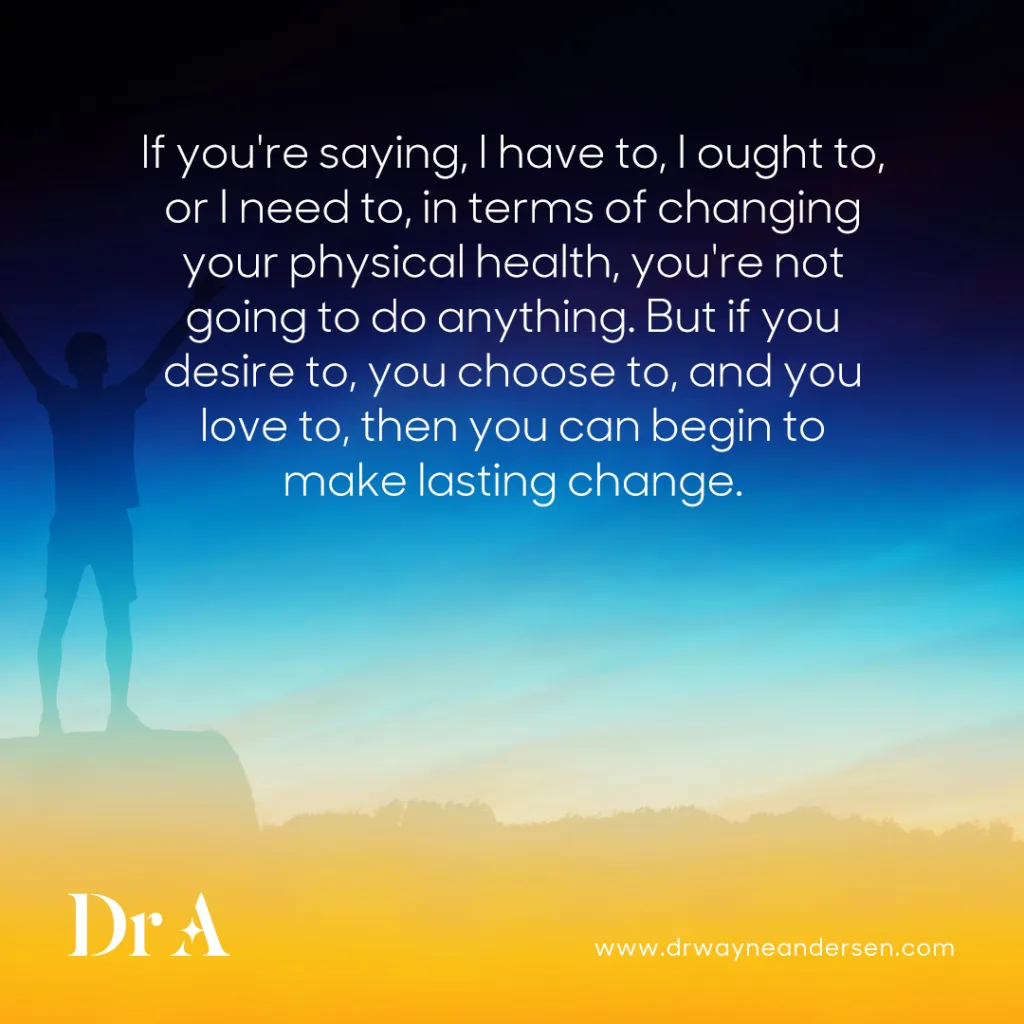
One is you can be kind and loving to your spouse, but what if you start becoming judgmental because they’re not changing and you are and you’re starting to become more conscious, and you’re judging them, or pointing, or trying to fix them? Then yeah. It can become a major issue, but that’s not what you should be doing. If you’re becoming more conscious and becoming transformational you should be able to— anything you’re starting to project on them, you should be wise enough now that you don’t project it. You work on yourself, and why am I feeling that way? And then work on what it says about me, not about them. Okay, so that’s the important thing. The other part of the coin is if you’re in a dysfunctional, codependent relationship and you start growing because you’re miserable and you’re growing, and becoming more, and becoming more tolerant, and your suffering is starting to disappear, and the other person tracks the other way and withdraws more, then you have to ask yourself for both of us, not just for you, but for the other relationship, is it best that we kind of accelerate this area where we kind of move— I have, one of my other friends that’s a ski instructor, after 40 years of marriage he, and he’s not studying this, but he realized in the relationship there was a codependency that wasn’t working anymore, and so he made a decision and we had a great talk. We had an hour talk the other day about where he’s going, and he asked me some questions, because he knows what I do, and now he feels strong and he just emailed me last night and said, “Thank you for those things. I’m applying those and it’s really helping.”
[00:39:54] So, I think you have to really ask the question because you’re here. In essence, if you think about the Drama Triangle, if you’re now not growing because your spouse doesn’t want to do it and you basically stopped doing it then you’re being a hero, and now you’re unconscious. Now you become unconscious, and you’re now supporting somebody, and you’re enabling them for more of the same behavior. That’s not helpful for them long term. So does that make sense?
Shelley: It does. It’s specific — totally — and specifically see it mostly with women, you know, they start to grow and evolve and then the husband you know gets controlling because they’re making money, and they’re working on their financial health, and they’re having a life outside of just the four walls of their home, and it seems like it’s threatening.
Dr. A: You can’t go back.
Shelley: Yeah.
Dr. A: When you become more conscious— you can’t put the toothpaste back in the tube. Once you become more conscious, you’re more conscious, and what you would be doing is role-playing and faking it, and creating a codependency if you try to go back, but you don’t have to judge them. You don’t have to try to get them to change and decide because what you’re doing is uncovering something that was dysfunctional and then you decide, can I now— because I’m becoming more conscious, can I be in a better relationship? Listen better? Be more understanding, but not compromise what I’m working on. Because remember, if your relationship is a dependency, it’s a codependency or basically where it’s conditional love.
Shelley: Yeah.
Dr. A: It doesn’t work long-term. What works long-term is unconditional love, and the person you need to love — and I don’t mean this in a narcissistic way — is yourself.
Shelley: Absolutely.
Dr. A: You’ve got to come to the point where you’re fully content and moving from self-sabotage. To start to be in the creative space where you— if that dysfunction is enough, where it allows you to now change and you’re actually being a better spouse because you’re listening better, but you’re not putting up with— well, just think about your kids. You can be a helicopter parent and do everything for them, or you can be an empowering parent and be there, and have to have tough love sometimes, right? But you’re moving them forward to be able to take care of themselves. In a relationship, you want a co-committed relationship, where you both add value to each other, and again, it’s up to— you don’t have to do this work. Just like I said earlier, you don’t have to change anything. You don’t have to. You don’t have to increase your standards if you’re happy where you are, but I would actually ask yourself first, am I happy where I am? Because I would say most people are suffering pretty dramatically in their relationships, where when they’re codependent and as a result of that they have to decide on where they want to go and do it in a way which serves both partners, right? And by being more of a hero or a victim and saying, “Oh, I wanted to grow but now I’m not because my husband doesn’t want me to.” That is not a good long-term strategy.
Shelley: Yeah. I hear a lot of women say, “I can’t.” You know? “My husband won’t let me,” and it’s like [crosstalk 00:43:14].
Dr. A: If you’re in that kind of relationship, that is not a relationship. That’s a dictatorship.
Shelley: Right. So what is a question— I don’t know if you can— what is a question that as somebody supporting people going through that, you would ask that woman, because there’s kind of, you don’t want to meddle, but at the same time you want to support the outcome of the evolution of the people that you’re trying [crosstalk 00:43:46].
Dr. A: It comes down to, you know, okay. So let’s look at comfort, because that’s where most humans sit, and certainly in a relationship that’s dysfunctional or codependent. It may be comfortable, there’s a lot of suffering involved, but it may be comfortable. You have to ask yourself the question, am I willing to grow, be open, and want to learn or is it more important for me to stay comfortable? Because comfortability in a relationship over time doesn’t lead to a co-commitment, and over time the relationship usually gets worse and worse, and in a one-sided relationship, “My husband won’t let me,” well, that’s the female being the victim. She’s being the victim and letting it happen, and you know, basically, some relationships end. You know, 50 years ago Catholics didn’t divorce, right? So you kind of stuck with it, but the world has changed, and the world, and decisions, and those things have dramatically changed.
If you try to stay in a paradigm that was 50 years old now, with everything around you changing, then it creates a lot of suffering. So that— but I never tell people what they should do [crosstalk 45:14]. I’m only here to listen and help awaken them to the point where they have choices, and they have to make that decision, but what ends up happening, change occurs when your vision of what could be, and the dissatisfaction of what is, is greater than the resistance of change. If You think about it. So that’s how it works. If you have a vision of now, what my life can be, and I’m now dissatisfied to the point where I’m ready, and the combination of those two, the vision and the dissatisfaction are greater than the resistance. The resistance is the fear of change, right? And then you have the first steps, and then you move into change. [crosstalk 00:46:01].
Shelley: And into creation from the Drama Triangle to Empowerment Triangle.
Dr. A: And you know what, when you’re living — just like I told you about vocation, if there’s something you love, and the things you value the most. If you’re focused on those, and you’re improving those, and making the things that matter the most to you, then you’re in the joy of your life. That’s when you’re true joy— that’s when you thrive. That’s when the work becomes not work, it becomes just joy, right? And I love this, you know, I wouldn’t have missed, I mean I was having a great day skiing, but I wouldn’t miss this, because if one person changes, then that’s, basically, that’s made me have feedback that we’re changing the world. One person at a time, right? And the world’s pretty messed up right now, and we need more people to rise up and become conscious. So that vertical development, I believe is more important than anything else in actually evolving our lives, and I think we’re put here to evolve our souls. Right? I think early on our egos, our soul was in service of our ego, but I think as we get older I think that we become in service of our soul, which is to add benefit to others and to have great relational health. That’s what you want, and if you have a totally codependent relationship, that’s not great relational health.
Shelley: Yep. Thank you. Appreciate it.
Dr. A: You’re welcome. You’re welcome. Okay, who’s next Rach? We have time for a couple more.
Rachel: All right. We have Mary. Mary, can you— there you are.
Dr. A: Hi, Mary.
Mary: Hi. Good morning, Dr. A. Thank you so much for this opportunity. I’m— this is spot on with what Shelley just shared, and Wanda, and also you, Dr. A. You mentioned earlier, as we grow we have— we find relationships that we continue to struggle with, and very similar to you, Dr. A, my relationship with my family, like my nucleus, my mother, my father, my brother, we were dysfunctional from the start. I was born into this very toxic, chaotic environment and I really felt like the parent at a very young age, and as I’m older now, you know, I’m almost 40, I just had a baby, I’m growing. The more I grow and work on myself, you know, I have a therapist, I have you, I have the team, the community, and a spiritual mentor. I have a hard time finding peace with the fact that I’ve pretty much have done all that could and I don’t want to, you know, I know I can’t change them, and my growth has been a lot different than theirs, and I’m just— I struggle with finding peace.
I think culturally and spiritually that we are better off separate. Like we’re better off with distance, and we all discovered this. We had a very traumatic event in 2005, and I’m sure you remember, Hurricane Katrina. We’re from New Orleans, and after that event, my parents divorced. We all split up. We all took our separate ways. I was barely 20 years old and the space was all good for us. We all had our own lives, and our own things, and over the years we’ve reconnected, and we’ve tried to like kind of, I guess have a relationship, but like just like you, after a day or two of us visiting with each other, it’s it’s like all these old things come up, and it’s like the kink in the chain comes up, and for me, and my husband, and my family, we’re like, we’ve realized we’re just better off having some distance, and there have been times where I’ll fall back in that old pattern of, “No. Well, maybe.” Because they’re going through a hard time, and like my mom will follow me. If I move to China, she’ll move there. They’ll think— so I guess the whole point, going back to the question is just, how do you find peace with that breakup? Especially when it’s like a family. A parent. You know, a sibling. Without that guilt. You know, that cultural guilt? Spiritual? Because sometimes, I mean without asking for advice, people unsolicited, like, “Oh, my God. You’re so lucky. You have your parents. You have this,” and if I even start to say, “Well, we’re not that close,” or like, “I don’t really take care of them.” You know, my culture, it’s like everyone lives together, and everyone’s dysfunctional, and stuff. So, I just want to find a place where like, I don’t— I kind of fear— now that I’m a parent I’m like, oh my God. I don’t want this to come back to like haunt me, or hinder my success. Does that make sense?
Dr. A: Yeah. No, it makes perfect sense, and understand this, you found an equilibrium, right? The bottom line is your family— well, let me back up for a minute. If your family lives together, like if you’re in a rural farm in the middle of Iowa, or somewhere, right? And you’ve all grown up together, and you live near each other, then it’s a little different dynamic, right? The nucleus is larger. There’s more interaction. You’re together, but what you’ve done is you’ve created space and that’s one of the things I was talking about earlier in emergence, moving from repetitive patterns, you make space, and so that’s what you’ve done. You’ve done that functionally, and you’ve taken, and you’re setting a standard, and you’re learning, and growing, and you’re setting that standard for your kids because you know, the whole point of life is to carry on the species in the grandest scheme of things, and so you’ve created an environment of love and caring, and you’ve been able to take the things you’ve learned with you and your husband. Congratulations on a baby. That’s really cool, but so you’re creating a healthy environment.
[00:51:40] Your current interaction with your past environment, with people that are blood relatives is not healthy, and your job isn’t to change them. Your job is to set imagery so that even for your child, in their interactions— I’ll tell you this, when I was a really little kid, my grandfather, on my mom’s side, is Italian and part of his family came from Sicily, and they were part of the mafia in New York City. He totally rejected that and became a cop and took me when I was really little to see the family because they wanted to see me, and I got a chance to see him, and it was a movie in The Godfather, and as we left there he said, “That’s the only time you’ll see them,” because he knew that he wanted to bring me up. He taught me integrity. He taught me right from wrong. I learned a lot of things from him, which was his counter-projection to the world he left, right? Because his values were greater, and I never saw them again, and I’m not the worst for that. So I don’t think we can put a round peg in a square hole, and I think at the age people are, because you’ve taken, you’ve actually taken, and you’ve created a healthy underlying structure.
They have not. They’ve stayed in the Drama Triangle. The victims and the villains, and so that environment, you don’t have the ability, because you’re not next to them, or an environment where you have multiple periods to be able to help heal that, it’s not really there. So what you can only hope is that over time they’ll come to their senses, and recognize, and realize. In the meantime, you don’t need to be guilty about that, you’re— just because, it’s like we talk about, your past is not your present, is not your future, and you’ve made a determination to build a healthy future for yourself and your family, and your relatives in that are not part of that equation. Will that change? Yes. You could be hopeful it’ll change, but you can’t wiggle your nose and change it. That’s not your job, and especially when you’re not– when they’re spread all over, you don’t have the ability to do that. So I think, from what I’m hearing, you’re doing okay, and you don’t need to feel guilty. It’s not you’re— the role is opposite. The elder help the younger become successful. It’s not about the younger helping the elder. It’s a downline so to speak, right? It’s you now setting the stage and learning from the things of the past, and what you can do is learn to forgive. To be grateful you have parents in their alive, and leave it at that. Then hopefully, over time, they’ll change to the point where you’ll find a crack, and we can make it better, but I wouldn’t spend one moment of time worrying about it.
Mary: Okay. Thank you so much, Dr. A. I appreciate it.
Dr. A: All right. We’re almost out of time, but I think we have one more. Rach?
Rachel: Yes we do. We have Kathy.
Dr. A: Kathy.
Rachel: Can you come on camera?
Dr. A: Let’s go a little longer. My instructor is gonna shoot me, but that’s okay.
Rachel: You’re still muted, Kathy.
Kathy: Hey, Dr. A! Are you in Colorado skiing?
Dr. A: I am. I’m up— here take a look at this. Just everybody take a look at how snowy [Dr. A shows the snow outside of his window].
Kathy: Oh, beautiful. I am down just south of Red Rocks Amphitheater in the foothills.
Dr. A: Oh, yeah, I love that area. I love that area.
Kathy: Yes. In King Carol. So, my question for you, I know you went over the seven areas and I feel like in six of those, they are great to good. Good to great, and in fact, I have to tell you we have eight Optavia coaches and clients that are competing in the natural bodybuilding competition, Muscle Mania here in Colorado, inspired by you and the active line, and I’m so proud of all of them. But my challenge is on the vocational side. I absolutely love health coaching. I’ve been in the corporate world, I don’t know 25, 30 years and it has gotten the point, Dr. A, it’s unbearable. I had a coworker throw me under the bus, telling my boss that I also do health coaching and therefore I’m not able, you know, it takes away from my corporate job. Which is so not true, but I really struggle with— how do you, in that one area that’s challenging, how do you keep moving forward when it’s so unbearable? I know I need to let it slide off my back and just keep doing the do and the daily action steps, but I would love your advice on just getting through this hurdle right now because I know ultimately what I want to do is health coaching full-time. It fills my soul, but it’s honestly, it’s just really challenging right now.
Dr. A: Yeah. Yeah, no, I hear that, and we probably won’t be able to fully address that because we’re out of time, but let me just give you a couple things to think about. First of all, that person is projecting, right? They’re projecting something, a deficit they have onto you and they’re, again, calling you out. But you know, you just said it— it’s not true. Right? It’s made up. It’s a person being in mean spirit. Probably jealous, and so you can’t let— you know, if we worry what everybody thinks about us, bottom line is we’re gonna be miserable. So you have to, you know the good you’re doing, and both, you’re doing good in your job and I would sit down with your boss, the person that actually is decision making, and say, you know, I’d love to talk to you. Is there any area where you see, and what I’m doing? And just face reality. In reality. Not in somebody’s story that they made up. In reality, is there anything that you see I’m not doing that I need to be doing in this job? Because basically, I do my job. I’m proud of what I do. I want to be good in my corporate job. I also enjoy helping people in my free time, but basically, is there any area— is there any truth that you see? And that’s the decision maker. So that’s the one, and just make peace with that. That’s your first step.
The others just pursue this, and to the point where you no longer need that, you know, that’s the [crosstalk 00:58:12] those are the two things. Stay based— reality is an acquired taste, but just because someone gets in the middle, and is either trying to get your job, or do something, or just doesn’t like you, or doesn’t matter what it is. Listen, we’re not going to be liked by everybody, but sit down with your boss because that’s the part you don’t want to build tension and dysfunction, because something that’s projected can become a reality over time, and that’s what you don’t want. So does that make sense?
Kathy: Totally. Thank you so much. You’re so inspiring.
Dr. A: You’re so welcome.
Kathy: Thank you for the mission.
Dr. A: Yeah, and good luck on that, okay? Let me know how that works out.
Kathy: Okay. Thank you.
Dr. A: All right guys. Well, we’re over a few minutes and I want to thank you all for coming on. What we’re doing basically is helping you and others really create health and wellbeing in their minds. Topic next month is: Consciousness and You: What Does it Mean? We want to really dial in so you really understand why this work is so important. It helps separate you and puts you in such a stronger position as you work on this. Most of us know we should go to the physical gym, or go for walks, or do things for our physical health, but most of us really ignore, and we kind of push down into the deep recesses of our mind, and our thoughts, our feelings, and the things that are important, and we want to learn to be able to handle those so you can move through and start to put on your lab coat and really understand our thoughts, and our feelings, and how we can influence those to actually put us in position to thrive into a time when most people really are suffering in their life. So with that, I want to thank Rachel and Chris for all their hard work and let’s go out, and get the world healthy. God bless.

